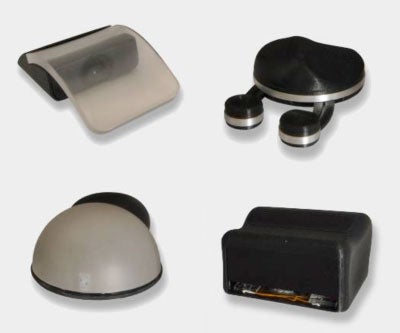Five New Microsoft Mouse Prototypes Tackle Multitouch, Look Crazy
By now you know the Windows 7 line, but in case you’ve somehow missed it: it’s the first major computer...

By now you know the Windows 7 line, but in case you’ve somehow missed it: it’s the first major computer operating system to support multitouch, meaning it (like an iPhone) can read more than one finger press at a time. Of course, in order to take advantage of touch, you need to upgrade your hardware — for a premium price, naturally.
Multitouch screens add a couple hundred bucks to the price of a monitor or laptop screen, but Microsoft’s Applied Sciences group is working to make it more available to the masses with peripherals. We got a sneak peek at five mouse concepts that read multitouch gestures from MS’s Dan Rosenfield and Shahram Izadi. There no word on when any of ’em will be mass-produced.
FTIR (Frustrated Total Internal Reflection) Mouse: A infrared camera shines through a curved plastic sheet on which your fingers rest to track your finger ticks (like pinching and scrolling) while a regular mouse sensor under the palmrest tracks movement.
Orb Mouse: This design also uses an IR camera to see how your hand moves, but instead of only tracking your fingers, it keeps an eye on your whole hand underneath its dome. Gestures are tracked through a mirror that reflects movement onto the camera lens.
Cap Mouse: Short for “Capacitive Mouse,” the Cap uses a curved multitouch surface on the front half of the mouse, essentially morphing it into a curved touchscreen.
Side Mouse: More palm rest than mouse, the Side mouse doesn’t have any touch sensors, but follows your fingers with a projected laser, thus turning your desktop into the defacto touch surface. Of the concepts, this one creates the largest mustitouch area overall; the laser can see directly in front of the rest and up to 60 degrees on either side.
Arty Mouse: The so-called “Articulated Mouse” tracks your index finger and thumb on separate pads, which makes it ideal for more minute tasks, like manipulating 3D rendering (or CAD) software.
